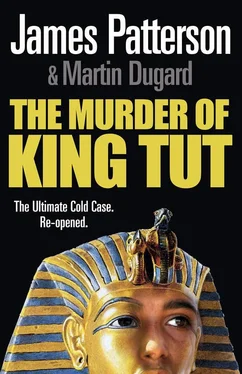“Did you want to see me, Mother?” He was so innocent-and yet so full of life. Nefertiti was overcome with warmth as she gazed upon the boy. She did love him, deeply, but not everyone in the court did. For some, he was already a hated rival.
“Yes, Tut. Come. Sit next to me. Sit close to your mother.”
Tut walked across the tile floor in his bare feet and plopped onto the divan next to Nefertiti.
“I heard about the pharaoh,” he said softly. “I’m sorry.”
She placed a hand underneath his chin and lifted it until his eyes met hers. “Your father hadn’t been feeling well for a long time,” she told him.
“How did he die?” Tut asked next. Always the questions with him.
She could never tell him the truth, but a lie didn’t feel right either. “He died in a burst of happiness. His heart was so filled with joy that it exploded.”
There. Not so bad.
“Tut, there’s something else we need to talk about. I need you to pay attention to what I have to tell you now.”
“Yes, Mother?”
“You are just a boy and have not yet been trained in the ways of the pharaoh. But you must know that this is your destiny.”
The boy stopped her. “I don’t understand.”
“You will be pharaoh one day, Tut.”
“I don’t want to be pharaoh. I don’t! Why can’t you be pharaoh, Mother?”
“It is not considered best for a woman to rule Egypt, Tut. But because I am of royal blood, I will find a way to rule for as long as it takes you to learn to be a great pharaoh.”
“How long will that be, Mother?”
“A dozen years, maybe less. Because you’re so bright, Tut. There is no hurry. The important thing is that you learn to be wise and strong and full of compassion for the people of Egypt, as your father was. He was a good man, always a good man.”
“Smenkare would have made a good pharaoh,” said Tut. “And he was your son. This day must make you sad.”
The boy was smart, which was probably why she loved him as she did.
“Smenkare is dead, Tut.” She neglected to add that she had never loved her own son as much as she loved Tut. She had tried, but there was no light in Smenkare’s eyes, and she felt no connection between them. Someone like that should never rule Egypt, and it was almost fitting that the job would now go to this precocious boy at her side.
“No, Tut. It must be you.”
Tut simply nodded. “So what do I do next? Help me, Mother.”
“See how we’re sitting here? You and me, right next to each other?”
“Yes. Of course I do.”
“This is how we will rule Egypt at first. Side by side, the two of us. For now I will make the decisions, because you are too young. But as you become a man, you will fill a bigger space and have the knowledge to make good decisions.”
“Then I will rule as pharaoh?”
“Yes, Tut. And I know that you will do great things. You will be a pharaoh people always remember.”
Amarna
1334 BC
THAT WAS THE PLAN for the boy who would be king, though it didn’t turn out that way. Not even close. Once again death would intrude-perhaps even murder.
“You live in a house full of women,” the military instructor informed Tut. “To be pharaoh, you must become a man. Someday, you will be as big and strong as I. Once you are through with your training, no man will stand in your way.”
Studying the instructor’s bulging biceps and massive chest, Tut had a hard time believing that could ever be true, but he listened closely to every word.
They stood in a great green field on the west side of the Nile. It was February, and the mild sun kissed the earth.
Tut was a skinny child whose slightly cleft palate gave him a mild lisp but who otherwise bore the flawless beauty of his mother. His arms were thin, and his sandal-clad feet supported legs that weren’t much bigger around. At the time of his death, Tut would be approximately five foot six, and his build would still be slight.
“Are you ready, sire?” asked the instructor.
Tut tried to speak, but in his nervousness only a sigh escaped his lips.
The instructor concealed a smile. “Let’s talk about the types of bows we will be using in our archery practice, then.”
The list was too long and too dazzling for Tut to remember right away-though the instructor made it very clear that the pharaoh would be proficient in each of them, along with shield and mace, sword fighting, spear throwing, chariot riding, horseback riding, hand-to-hand combat, daggers, throw sticks, boomerangs, clubs, and battle-axes. For today’s lesson there was a double-composite angular bow, composite angular “bow of honor,” bow staves, and short self bows. That was all he had to master.
The bows were made of birch that was then wrapped in sinew and bark for durability. Gold leaf and ivory decorations adorned their curved shafts. The instructor’s great bow was taller than Tut, while Tut’s bow was only big enough to reach just above his knee when he stood it on the ground.
The instructor placed the bow in Tut’s little hands: “Now listen to me. You will want these with you in the afterworld. On the day you are buried, all your bows will be buried with you. So learn to use them well, Highness. The rules of combat you are about to learn will stand you in good stead… forever.”
Tut notched an arrow in the bow and pulled back the string. His shot hit the target cleanly on the first try, though it wasn’t far from the boy.
“Very good, sire. You are a natural.”
Amarna
1333 BC
“YOU’RE LATE. I won’t tolerate this, Tutankhamen. There’s no excuse for such conduct.”
Tut raced into the royal classroom at the prince’s school with mud from the Nile still coating the soles of his feet, his favorite hunting bow in hand. He had been out in the reeds again, shooting ducks, and realized too late that it was time for class.
He had no chance to clean up, and now, pharaoh- in-training or not, he would face the instructor’s wrath.
“Instructor, I-”
“Quiet. Not a word from you. Sit down and practice your hieroglyphics.”
The teacher was a thin, dyspeptic young man who didn’t walk about the room so much as he flitted like a nervous bird. Tut liked to mimic him for the amusement of his sister, but now she was too busy giggling at Tut’s misfortune for him to attempt a joke.
The standard punishment for tardiness was to repeatedly write hieroglyphic characters on a piece of papyrus. The task often took hours, which the instructor knew was absolute torture for Tut.
He was eight now, and his latest passion was chariot lessons. Two hours spent writing meant two less hours spent at the reins, speeding across the open desert.
Much as his father would have hated it, Tut longed for the day when he would lead the warriors of Egypt into battle. He pictured himself in a chariot, two mighty steeds galloping before him, an army of thousands responding to his every command. But this was no daydream-it would actually come to be-and sooner rather than later.
“Well done, Pharaoh,” whispered his sister Ankhesenpaaten. She was a few years older than him, but mature in the way of deeply practical children. And she was a beautiful girl, even better-looking than Tut.
“Someday,” the teacher announced, “when you reign over Egypt as the one true pharaoh, you can have me killed for my insolence, but until then this is my classroom and you will do as you are told-and that includes arriving on time. Am I understood, Tutankhamen?”
A furious, red-faced Tut nodded his head and placed a fresh reed in his mouth, making sure not to make eye contact with his sister, who now snickered at his misfortune. Tut chewed the end of the reed, feeling the fibers break apart until they formed a loose and supple paintbrush.
Читать дальше












